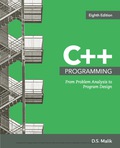
Explanation of Solution
The program execution is explained in the in-lined comments:
#include <iostream>
using namespace std;
int main()
{
//declare variables dec1, dec2 and initialize
double dec1 = 2.5;
double dec2 = 3.8;
//declare double pointers p and q
double *p, *q;
//assign the address of variable dec1 to p
p = &dec1;
//assign the value of dec2 - dec1 to the memory
//location pointed to by p which is dec1
//so dec1 now holds the value (3.8-2.5 =) 1.3
*p = dec2 - dec1;
//q is assigned the value of p so both the pointers
//now point to variable dec1
q = p;
//content of the memory location pointed to by q
//is assigned 10.00 so dec1 holds the value 10.0
*q = 10.0;
//the contents of the memory location pointed to by p
//i.e dec1 is assigned the value of the RHS expression
//RHS = 2 &*#x00A0;10 + 10...
Want to see the full answer?
Check out a sample textbook solution
Chapter 12 Solutions
EBK C++ PROGRAMMING: FROM PROBLEM ANALY
- C++ Write a program that takes as input an arithmetic expression followed by a semicolon ;. The program outputs whether the expression contains matching grouping symbols. For example, the arithmetic expressions {25 + (3 – 6) * 8} and 7 + 8 * 2 contains matching grouping symbols. However, the expression 5 + {(13 + 7) / 8 - 2 * 9 does not contain matching grouping symbols. If the expression contains matching grouping symbols, the program output should contain the following text: Expression has matching grouping symbol If the expression does not contain matching grouping symbols, the program output should contain the following text: Expression does not have matching grouping symbols.arrow_forwardAsaparrow_forward1 Write a C++ program to calculate a rectangle's area. The program consists of the following function: • getLength This function should ask the user to enter the rectangle's length, and then returns that value as a double • getWidth - This function should ask the user to enter the rectangle's width, and then returns that value as a double. getArea – This function should accept the rectangle's length and width as arguments and return the rectangle's area. • displayData – This function should accept the rectangle's length, width and area as arguments, and display them in an appropriate message on the screen. main – This function consists of calls to the above functions.arrow_forward
- What is “std::length_error”? Use this in any C++ code where must use your reg# as length_ error??arrow_forwardLook at the following C++ code and comment each line about how it works with pointer. int i = 33; double d = 12.88; int * iPtr = &i; double * dPtr = &d; // iPtr = &d; // dPtr = &i; // iPtr = i; // int j = 99; iPtr = &j; //arrow_forwardQ5: What are the output of the following segment of C++ code: int i; i = 12; do { cout 0 );arrow_forward
- Q9/Write a program with c++ that inputs a three-digit integer, separates the integer into its individual digits and prints the digits separated from one another by three spaces each by using functions. For example, if the user types in 429, the program should print: 4 2 9arrow_forwardplease help me answer this question I will give you a good rating Thank you! In c++ please 1 #include <sys/types.h> 2 #include <sys/wait.h> 3 #include <unistd.h> 4 #include <stdlib.h> 5 6 #include <iostream> 7 8 using namespace std; 9 10 11 // Given a number, this function should print the associated generation 12 // of the child. along with the child's process ID and the parent's process ID. 13 // 14 // Generations should be: 15 // 0 - Parent 16 // 1 - Child 17 // 2 - Grandchild 18 // 3 - Great Grandchild 19 // 4 - Great Great Grandchild 20 // etc. 21 // 22 // Examples: 23 // 24 // printGeneration(1): Child. pid: <pid>: ppid: <ppid> 25 // printGeneration(3): Great Grandchild. pid: <pid> ppid: <ppid> 26 // 27 void printGeneration(int generation) 28 { 29 // TODO: Add Implementation of printGeneration here 30 } 31 32 33 int main(int argc, char ** argv) 34 { 35 // TODO: The program should take a single numeric command line…arrow_forward2. What is the output of this C code? void main(){ int a=0,i=0,b; for(i=0;i<5;i++){ a++; if(i==3) break;} cout<<" i="<arrow_forwardarrow_back_iosSEE MORE QUESTIONSarrow_forward_ios
 Database System ConceptsComputer ScienceISBN:9780078022159Author:Abraham Silberschatz Professor, Henry F. Korth, S. SudarshanPublisher:McGraw-Hill Education
Database System ConceptsComputer ScienceISBN:9780078022159Author:Abraham Silberschatz Professor, Henry F. Korth, S. SudarshanPublisher:McGraw-Hill Education Starting Out with Python (4th Edition)Computer ScienceISBN:9780134444321Author:Tony GaddisPublisher:PEARSON
Starting Out with Python (4th Edition)Computer ScienceISBN:9780134444321Author:Tony GaddisPublisher:PEARSON Digital Fundamentals (11th Edition)Computer ScienceISBN:9780132737968Author:Thomas L. FloydPublisher:PEARSON
Digital Fundamentals (11th Edition)Computer ScienceISBN:9780132737968Author:Thomas L. FloydPublisher:PEARSON C How to Program (8th Edition)Computer ScienceISBN:9780133976892Author:Paul J. Deitel, Harvey DeitelPublisher:PEARSON
C How to Program (8th Edition)Computer ScienceISBN:9780133976892Author:Paul J. Deitel, Harvey DeitelPublisher:PEARSON Database Systems: Design, Implementation, & Manag...Computer ScienceISBN:9781337627900Author:Carlos Coronel, Steven MorrisPublisher:Cengage Learning
Database Systems: Design, Implementation, & Manag...Computer ScienceISBN:9781337627900Author:Carlos Coronel, Steven MorrisPublisher:Cengage Learning Programmable Logic ControllersComputer ScienceISBN:9780073373843Author:Frank D. PetruzellaPublisher:McGraw-Hill Education
Programmable Logic ControllersComputer ScienceISBN:9780073373843Author:Frank D. PetruzellaPublisher:McGraw-Hill Education





